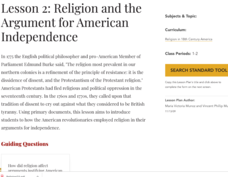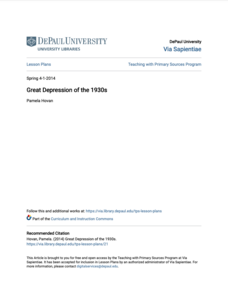Curated OER
Excerpt: Cecil Rhodes' Confession of Faith (1877)
Consider the words of Cecil Rhodes after reading this short excerpt from his publication, Confession of Faith. Upper graders read the excerpt then answer two questions analyzing the view of Africans toward his praise of British...
Student Handouts
The Cold War: The Truman Doctrine of 1947
What was the Truman administration's position on foreign policy during the Cold War? Class members respond to an excerpt from President Harry S. Truman's "Truman Doctrine" with three questions in the space provided.
We are Teachers
Read Like a Detective
Encourage your young readers to become true detectives in their next literary adventure! Here you'll find an attractive display that will prompt your learners to constantly be looking for clues, asking questions, making cases about the...
Stanford University
Carlisle Indian Industrial School
How do policies aimed to help actually hurt? Native American boarding schools—an attempt at assimilating children of indigenous tribes into white culture—had a shattering effect on those who attended. With primary sources, including...
Humanities Texas
Primary Source Worksheet: Thomas Jefferson, Confidential Message to Congress Concerning Western Exploration and Relations with the Indians
A confidential message written by Thomas Jefferson provides readers with an opportunity to practice their reading comprehension skills. The resource, part of a series, includes questions that require a close reading of the message and a...
National Endowment for the Humanities
Lesson 4 James Madison: Internal Improvements Balancing Act—Federal/State and Executive/Legislative
Who has the power? The founding fathers asked the same question when the United States was formed. Learners explore issues that arose during Madison’s presidency that raised constitutional questions. Through discovery, discussion, and...
National Endowment for the Humanities
Lesson 2 James Madison: The Second National Bank—Powers Not Specified in the Constitution
How much power is too much power for the federal government? Scholars use primary documents and constitutional research in groups to analyze the creation of the Second National Bank under James Madison. This is the second lesson of a...
National Endowment for the Humanities
Lesson 1: The First Great Awakening
High schoolers examine the First Great Awakening and how it affected religious belief in colonial America. They read and analyze primary source documents, explore various websites, and write a five-paragraph essay examining the beliefs...
National Endowment for the Humanities
Lesson 2: Religion and the Argument for American Independence
Young scholars examine how religion affected arguments justifying American independence. They read and analyze primary source documents, and write an essay analyzing how Americans used religious arguments to justify revolution against a...
National Endowment for the Humanities
The Rise and Fall of Joseph McCarthy
"I have here in my hand . . ." The war against Communism and Joseph McCarthy’s place in it are the focus of a series of lessons examining postwar America from 1945-1954. Joseph McCarthy takes center stage in this, the final lesson plan...
National Endowment for the Humanities
Ending the War, 1783
The various peace proposals, made by both sides, to end the Revolutionary War come under scrutiny in this final lesson of a three-part series on the war. Class members read primary source documents and compare them with military...
National Endowment for the Humanities
The War in the North, 1775–1778
Using primary source documents, including maps, learners examine Revolutionary War events from 1775 to 1778. The focus here is on the challenges George Washington and the Continental army faced and how they persevered in spite of those...
National Endowment for the Humanities
The War in the South, 1778–1781
The second in a three-part look at the Revolutionary War focuses the years from 1778 through 1781 and zooms in on military operations in the southern colonies, the French alliance, and the role African-Americans played in events. Class...
Curated OER
The Changing Role of Women
Eleventh graders examine the evolution of women's rights in America. As they analyze primary documents and discuss historical events, learners determine how Abigail Adams, Eleanor Roosevelt, Lady Bird Johnson, Margaret Sanger, and James...
Middle Tennessee State University
John Brown: Hero or Villain?
"Love it or leave it." "You're either for us or against us." Rhetoric and it's polarizing effects are the focus of a lesson that uses John Brown's attack on Harper's Ferry as an exemplar. Groups examine primary source documents,...
Via Sapientiae at DePaul University
The Great Depression of the 1930s
A 10-lesson unit takes young historians through a study of The Great Depression and life in the 1930s. The crash of the stock market, the Dust Bowl, unemployment, and mass migration west are all addressed through the analysis of primary...
Alabama Department of Archives and History
Alabama's 1901 Constitution: What Was at Stake?
Who should be able to vote? As part of a study of the 1901 Alabama Constitution, class members examine primary source document that reveal the reasons the authors gave to support their positions on this question and their assumptions in...
Alabama Department of Archives and History
Alabama's Secession in 1861: Embraced with Joy and Great Confidence. Why?
From December 20, 1860 to June 8, 1861, eleven states seceded from the Union. Alabama seceded on January 11, 1861. Why did so many white Alabamians want to secede? Why did they believe the South could win the war? These are the essential...
Alabama Department of Archives and History
Cells for Sale - Convict Leasing in Alabama
The benefits and drawbacks of convict leasing following the Civil War are the focus of a lesson that asks groups to examine primary source materials to gain an understanding of the program before individuals decide whether they are in...
Alabama Department of Archives and History
Montgomery Bus Boycott: We Would Rather Walk!
Have historians use primary sources to learn about the circumstances and implementation of the Montgomery Bus Boycott, and think about the issue of boycotts as a means of effecting social change. Wrap it up with a letter to the editor...
Alabama Department of Archives and History
The Wrong Side of History: How One Group Justified Its Opposition on the Freedom Riders and Civil Rights for African Americans
Designed as a supplement to the study of the Freedom Riders, this resource uses primary sources to reveal the views of those who opposed the Freedom Riders. After careful study of the arguments presented by the members of the Montgomery...
Curated OER
From George to Martha: Writing a Sonnet Using Primary Sources
What was the relationship like between George and Martha Washington? To protect their privacy, Martha Washington destroyed all her husband’s letters after his death so historians have little evidence of their lives together. Two letters...
Curated OER
Introduction to Age of Absolutism
Who were the absolute monarchs of Europe and what effect did they have on their countries? Young historians begin by naming qualities they believe are important for a monarch to possess. They then take notes on four key factors leading...
Student Handouts
Examining Primary Sources: Rudyard Kipling, “The White Man’s Burden” (1899)
Combine literature and history with the poem "The White Man's Burden" by Rudyard Kipling. Pupils read the poem and answer four questions about the text.
Other popular searches
- Using Primary Sources
- Wwi, Primary Sources
- Rosa Parks Primary Documents
- Gilded Age Primary Sources
- Working With Primary Sources
- Primary Resources Hsie
- Web Quests Primary Sources
- Ancient Rome Primary Sources
- 1920 1929 Primary Sources
- Primary Sources and Family
- Conscription Primary Sources
- Scotland Primary Sources

























